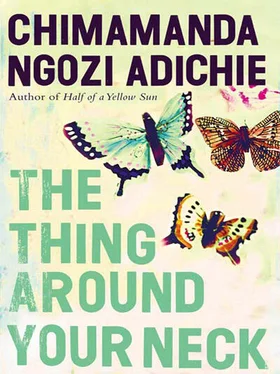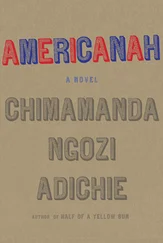The neighbors came over when they heard her. It was the woman from the house across the road — the one whose dog rummaged in Grandmama’s dustbin in the mornings — who coaxed the American phone number from your numb lips and called your mother. It was also that neighbor who unclasped your and Dozie’s hands, made you sit down, and gave you some water. The neighbor tried, too, to hold you close so you would not hear Grandmama as she talked to your mother on the phone, but you slid away from the woman, closer to the phone. Grandmama and your mother were focused on Nonso’s body, rather than his death. Your mother was insisting that Nonso’s body be flown back to America right away and Grandmama was repeating your mother’s words and shaking her head. Madness lurked in her eyes.
You knew Grandmama had never liked your mother. (You had heard Grandmama say this some summers before to her friend — That black American woman has tied up my son and put him in her pocket.) But watching Grandmama on the phone, you understood that she and your mother were united. You were sure your mother had the same red madness in her eyes.
When you talked to your mother, her voice echoed over the line in a way it had never done all the years before when you and Nonso spent summers with Grandmama. Are you all right? she kept asking you. Are you all right? She sounded fearful, as though she suspected that you were all right, despite Nonso’s death. You played with the phone wire and said little. She said she would send word to your father, although he was somewhere in the woods attending a Black Arts festival where there were no phones or radios. Finally she sobbed a harsh sob, a sob like the bark of a dog, before she told you everything would be fine and she was going to arrange for Nonso’s body to be flown back. It made you think of her laugh, a ho-ho-ho laugh that started deep inside her belly and did not soften as it came up and did not suit her willowy body at all. When she went into Nonso’s room to say good night, she always came out laughing that laugh. Most times, you pressed your palms to your ears to keep the sound out, and kept your palms pressed to your ears even when she came into your room to say Good night, darling, sleep well. She never left your room with that laugh.
After the phone call, Grandmama lay stretched out with her back on the floor, eyes unblinking, rolling from side to side, as though she were playing some sort of silly game. She said it was wrong to fly Nonso’s body back to America, that his spirit would always hover here. He belonged to this hard earth that had failed to absorb the shock of his fall. He belonged to the trees here, one of which had let go of him. You sat and watched her and at first you wished she would get up and take you in her arms, then you wished she wouldn’t.
It has been eighteen years and the trees in Grandmama’s yard look unchanged; they still reach out and hug one another, still cast shadows over the yard. But everything else seems smaller: the house, the garden at the back, the water tank copper-colored from rust. Even Grandmama’s grave in the backyard looks tiny, and you imagine her body being crumpled to fit a small coffin. The grave is covered with a thin coat of cement; the soil around it is freshly dug and you stand next to it and picture it in ten years’ time, untended, tangled weeds covering the cement, choking the grave.
Dozie is watching you. At the airport, he had hugged you cautiously, said welcome and what a surprise that you came back, and you stared at his face for a long time in the busy, shuffling lounge until he looked away, his eyes brown and sad like those of your friend’s poodle. You didn’t need that look, though, to know that the secret of how Nonso died was safe with Dozie, had always been safe with Dozie. As he drove to Grandmama’s house, he asked about your mother and you told him that your mother lived in California now; you did not mention that it was in a commune among people with shaved heads and pierced breasts or that when she called, you always hung up while she was still speaking.
You move toward the avocado tree. Dozie is still watching you and you look at him and try to remember the love that clogged you up so fully that summer you were ten, that made you hold on tight to Dozie’s hand the afternoon after Nonso died, when Dozie’s mother, your aunty Mgbechibelije, came to take him away. There is a gentle sorrow in the lines across his forehead, a melancholy in the way he stands with his arms by his sides. You suddenly wonder if he longed, too, like you did. You never knew what was beneath his quiet smile, beneath the times he would sit so still that the fruit flies perched on his arms, beneath the pictures he gave you and the birds he kept in a cardboard cage, petting them until they died. You wonder what, if anything, he felt about being the wrong grandson, the one who did not bear the Nnabuisi name.
You reach out to touch the trunk of the avocado tree; just as Dozie starts to say something, startling you because you think he is going to bring up Nonso’s death, but he tells you that he never imagined that you would come back to say goodbye to Grandmama because he knew how much you hated her. That word—“hate”—hangs in the air between you both like an accusation. You want to say that when he called you in New York, the first time you were hearing his voice in eighteen years, to tell you that Grandmama had died — I thought you would want to know, were his words — you leaned on your office desk, your legs turning molten, a lifetime of silence collapsing, and it was not Grandmama you thought of, it was Nonso, and it was him, Dozie, and it was the avocado tree and it was that humid summer in the amoral kingdom of your childhood and it was all the things you had not allowed yourself to think about, that you had flattened to a thin sheet and tucked away.
But instead you say nothing and press your palms deep into the rough trunk of the tree. The pain soothes you. You remember eating the avocados; you liked yours with salt and Nonso didn’t like his with salt and Grandmama always clucked and said you did not know what was good when you said the unsalted avocado nauseated you.
* * *
At Nonso’s funeral in a cold cemetery in Virginia with tombstones jutting out obscenely, your mother was in faded black from head to toe, even a veil, and it made her cinnamon skin glow. Your father stood away from both of you, in his usual dashiki, milk-colored cowries coiled round his neck. He looked as if he were not family, as if he were one of the guests who sniffled loudly and later asked your mother in hushed tones exactly how Nonso had died, exactly how he had fallen from one of the trees he had climbed since he was a toddler.
Your mother said nothing to them, all those people who asked questions. She said nothing to you, either, about Nonso, not even when she cleaned up his room and packed his things. She did not ask if you wanted to keep anything, and you were relieved. You did not want to have any of his books with his handwriting that your mother said was neater than typewritten sentences. You did not want his photographs of pigeons in the park that your father said showed so much promise for a child. You did not want his paintings, which were mere copies of your father’s only in different colors. Or his clothes. Or his stamp collection.
Your mother brought Nonso up, finally, three months after his funeral, when she told you about the divorce. She said the divorce was not about Nonso, that she and your father had long been growing apart. (Your father was in Zanzibar then; he had left right after Nonso’s funeral.) Then your mother asked: How did Nonso die?
You still wonder how those words tumbled out of your mouth. You still do not recognize the clear-eyed child that you were. Maybe it was because of the way she said the divorce was not about Nonso — as though Nonso was the only one capable of being a reason, as though you were not in the running. Or maybe it was simply that you felt the burning desire that you still feel sometimes, the need to smooth out wrinkles, to flatten things you find too bumpy. You told your mother, with your tone suitably reluctant, that Grandmama had asked Nonso to climb to the highest branch of the avocado tree to show her how much of a man he was. Then she frightened him — it was a joke, you assured your mother — by telling him that there was a snake, the echi eteka, on the branch close to him. She asked him not to move. Of course he moved and slipped off the branch, and when he landed, the sound was like many fruits falling at the same time. A dull, final plop. Grandmama stood there and stared at him and then started to shout at him about how he was the only son, how he had betrayed the lineage by dying, how the ancestors would be displeased. He was breathing, you told your mother. He was breathing when he fell but Grandmama just stood there and shouted at his broken body until he died.
Читать дальше











